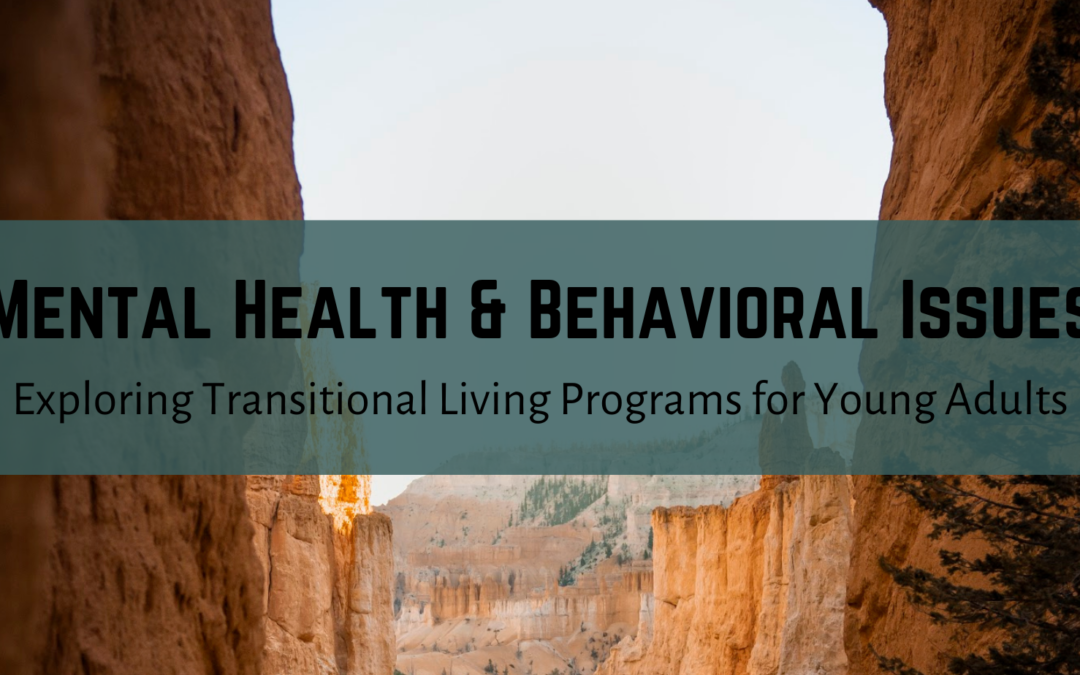In an ever-evolving world, the challenges faced by young adults in navigating their mental health and behavioral issues are complex and diverse. The journey towards mental well-being often requires comprehensive and tailored interventions that address the unique needs of this demographic. Transitional living programs, especially designed for young men, have emerged as valuable resources in this endeavor. In this article, we delve into the realm of mental health and behavioral issues faced by young adults and explore the effectiveness of therapy programs tailored to their needs.
The transition from adolescence to adulthood is a period of significant change and self-discovery. During this phase, many young adults grapple with mental health and behavioral challenges that can impact their overall well-being and future trajectories. Recognizing the unique needs of this age group, transitional living programs and therapy initiatives have emerged to provide specialized support.
Understanding Mental Health and Behavioral Issues in Young Adults
Common Challenges
The journey into young adulthood is a phase characterized by a complex interplay of internal and external factors that can significantly influence mental health and behavioral patterns. As young adults navigate the transition from adolescence to full-fledged independence, they encounter a range of common challenges that can impact their psychological well-being. These challenges encompass a diverse spectrum, including academic pressures, career uncertainties, identity exploration, peer relationships, and financial responsibilities.
- Academic Pressures: The pursuit of higher education and the expectations associated with academic success can create immense pressure on young adults. Balancing coursework, examinations, and future career prospects can lead to heightened stress and anxiety, potentially affecting mental health.
- Career Uncertainties: The quest to establish a stable career path and make significant life choices can trigger feelings of uncertainty and self-doubt. The pressure to select a suitable career and embark on a professional journey can contribute to feelings of anxiety and apprehension.
- Identity Exploration: Young adulthood is a period of self-discovery and identity formation. Exploring one’s values, beliefs, and personal identity can be both exhilarating and daunting, potentially leading to feelings of confusion and insecurity.
- Peer Relationships: Building and maintaining peer relationships takes on a new significance during this phase. The desire to belong and connect with peers, while simultaneously navigating complex social dynamics, can impact self-esteem and emotional well-being.
- Financial Responsibilities: The transition to financial independence brings with it a host of responsibilities, including budgeting, managing expenses, and making sound financial decisions. The strain of financial obligations can contribute to stress and anxiety.
Impact on Well-being
The untreated mental health and behavioral issues that arise during young adulthood can have profound and far-reaching effects on overall well-being. The challenges and pressures faced during this phase can impact various aspects of a young adult’s life, including physical health, emotional equilibrium, interpersonal relationships, and the pursuit of personal goals.
- Academic and Vocational Impairment: Mental health challenges can hinder academic performance and impede the pursuit of vocational aspirations. Difficulties in concentrating, managing stress, and maintaining motivation can hinder the ability to excel academically and professionally.
- Interpersonal Strain: Unaddressed mental health and behavioral issues can strain relationships with family, friends, and romantic partners. Challenges in communication, emotional regulation, and coping strategies can lead to conflict and isolation.
- Limited Coping Mechanisms: Young adults who lack effective coping mechanisms may resort to maladaptive behaviors, such as substance abuse or risky activities, as a means of managing stress and emotional distress.
- Developmental Impact: The challenges of mental health and behavioral issues during this crucial developmental phase can impact the acquisition of essential life skills, emotional resilience, and the ability to effectively navigate future life transitions.
- Long-Term Consequences: Left unaddressed, mental health and behavioral issues in young adulthood can potentially have long-term consequences that extend into later life stages. Early intervention and support are pivotal in preventing the escalation of these challenges.
Transitional Living Programs: A Holistic Approach
What are Transitional Living Programs?
Transitional living programs provide a structured and supportive environment for young adults who are facing mental health and behavioral challenges. These programs aim to bridge the gap between traditional treatment settings and independent living by offering a holistic approach to recovery. Participants engage in therapeutic activities, skill-building exercises, and experiential learning opportunities that empower them to navigate the complexities of adulthood.
Benefits of Transitional Living Programs for Young Adults
Transitional living programs offer a range of benefits tailored to the unique needs of young adults. These programs provide a safe space for individuals to develop essential life skills, such as time management, communication, and problem-solving. The structured nature of the programs also promotes accountability and self-discipline, enabling participants to take ownership of their recovery journey.
Tailored Therapy Programs for Young Men
The Importance of Gender-Specific Treatment
Recognizing that young men may have distinct experiences and needs, gender-specific therapy programs have gained prominence. These programs create a comfortable and supportive environment where young men can openly address their challenges and emotions. Gender-specific therapy acknowledges the unique social pressures and expectations that young men may face, allowing for more targeted interventions.
Therapeutic Approaches for Young Men
Therapy programs for young men often incorporate a variety of evidence-based therapeutic approaches. Cognitive-behavioral therapy (CBT) helps individuals reframe negative thought patterns and develop healthy coping strategies. Group therapy fosters a sense of camaraderie and provides a platform for young men to share their experiences and insights. Additionally, adventure therapy and outdoor activities can help young men build confidence, overcome challenges, and develop resilience.\

Navigating the Journey of Recovery
Personal Growth and Skill Development
Transitional living and therapy programs emphasize personal growth and skill development. Participants learn practical skills that are essential for independent living, such as budgeting, cooking, and time management. These skills empower young adults to build a strong foundation for their future while simultaneously addressing their mental health needs.
Building Resilience and Coping Strategies
Resilience is a cornerstone of mental well-being. Transitional living and therapy programs equip young adults with tools to build resilience and develop effective coping strategies. Through guided exercises, mindfulness practices, and therapy sessions, participants learn to manage stressors, regulate emotions, and navigate life’s challenges.
Conclusion
The intersection of mental health and behavioral issues in young adults calls for targeted and comprehensive interventions. Transitional living programs and gender-specific therapy initiatives have emerged as powerful tools in addressing the unique needs of this demographic. By providing a supportive environment, teaching essential life skills, and promoting resilience, these programs empower young adults to embark on a journey of recovery, growth, and a brighter future.

